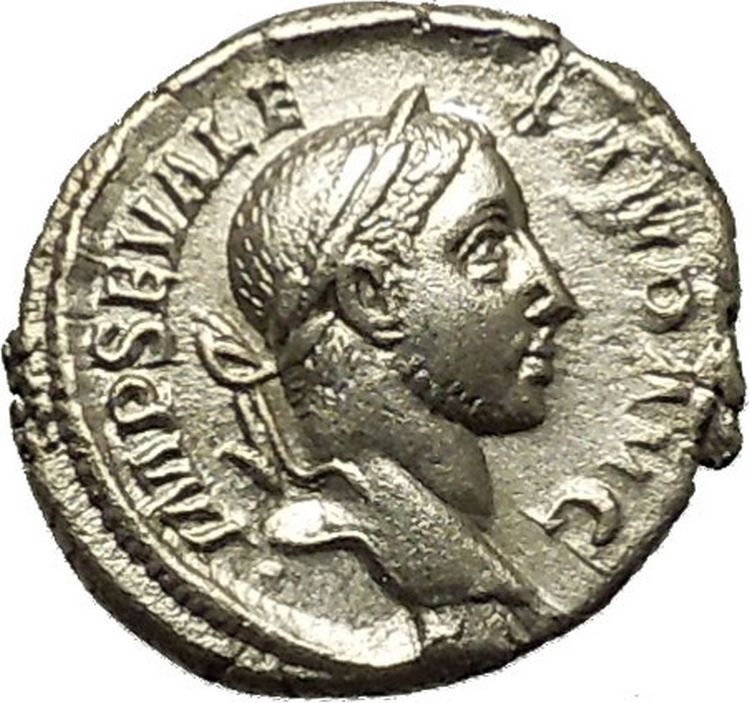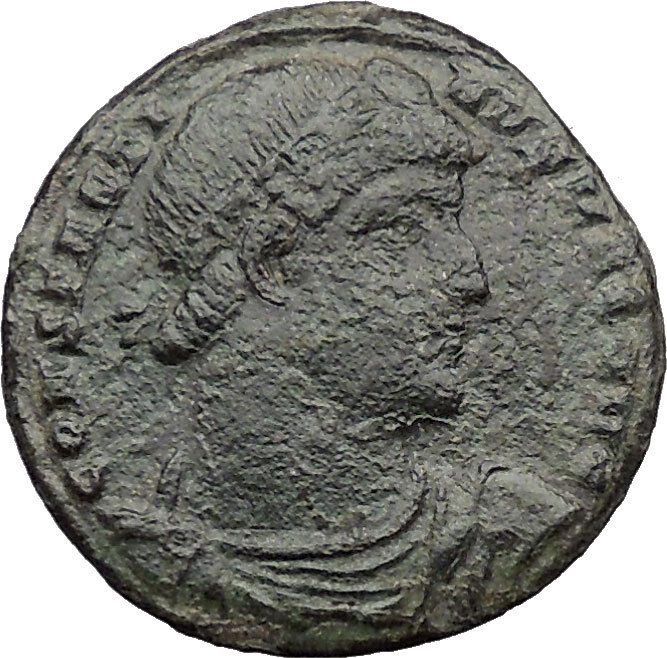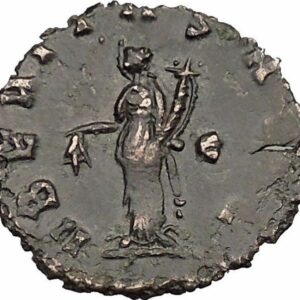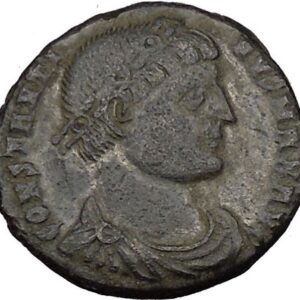|
Probus – Roman Emperor: 276-282 A.D.
Bronze Antoninianus 21mm (4.1 grams) Serdica mint, struck 276/277 A.D.
Reference: RIC 845
IMP C M AVR PROBVS AVG, radiate, draped and cuirassed.
PROVIDEN DEOR, Providentia standing right, holding two ensigns, facing Sol standing left, right hand raised, left hand holding globe; star between, KAΓ in exergue. .
You are bidding on the exact item pictured, provided with a Certificate of Authenticity and Lifetime Guarantee of Authenticity.
Sol was the solar deity in Ancient Roman religion. It was long thought that Rome actually had two different, consecutive sun gods. The first, Sol Indiges, was thought to have been unimportant, disappearing altogether at an early period. Only in the late Roman Empire, scholars argued, did solar cult re-appear with the arrival in Rome of the Syrian Sol Invictus, perhaps under the influence of the Mithraic mysteries. Recent publications have challenged the notion of two different sun gods in Rome, pointing to the abundant evidence for the continuity of the cult of Sol, and the lack of any clear differentiation – either in name or depiction – between the “early” and “late” Roman sun god.
In Roman mythology, Providentia was the goddess of forethought. Providentia (Providence). With all their vices, follies, and gross superstitions (indeed, in spite of them), the Romans still appear to have cherished a belief in the perpetual and direct interposition of the gods with respect to human affairs. Among the various monuments which attest this religious feeling, or at leas this profession of religion, on the part of both princes and people, none are more conspicuous than those to be found on their imperial coins, for it is to be observed that previous to the substitution of the monarchical for the republican form of government, that allegorical divinity whose name is derived from providere (to foresee) is not seen either on metal or on marble. In ancient Roman religion, Providentia is a divine personification of the ability to foresee and make provision. She was among the embodiments of virtues that were part of the Imperial cult of ancient Rome. Providentia thus figures in art, cult, and literature, but has little or no mythology as such.
Providentia was an important moral and philosophical abstraction in Roman discourse. Cicero says it is one of the three main components of prudentia, “the knowledge of things that are good or bad or neither,” along with memoria, “memory,” and intellegentia, “understanding.” The Latin word is the origin of the Christian concept of divine providence.
Imperial cult
Upon the death of Augustus, the emperor Tiberius established an altar to Providentia Augusta in recognition of “the godhead manifested in his father’s provisions for the Roman state.” The cult title Augusta was attached also to such goddesses as Pax, Justitia, and Concordia during the Imperial era. Traditional epithets invoked a deity within a specific functional sphere by declaring their power. The title Augusta thus fixed the divinity’s force within the sphere of the emperor as Augustus.
In 28 AD, after Tiberius arrested and executed Sejanus for conspiracy, the Cult of Virtues played a role in the propaganda that presented the restoration of Imperial order as a return to constitutional government. Sacrifices were offered to Providentia along with Salus (“Security”), Libertas (“Liberty”), and the Genius. Providentia at this time also received a permanent full-time priest (sacerdos) devoted to her. In the wake of the Pisonian conspiracy against Nero, religious observances in 59 AD to repair the state included sacrifices by the Arval Brethren to various deities, among them Providentia.
Providentia appeared on Roman coins issued under Vespasian, Trajan, Hadrian, Antoninus Pius, Septimius Severus, Commodus and Diocletian. A coin issued by Titus depicted his deified father Vespasian handing a globe to his son as his successor, with the legend Providentia Augusta. Coins issued by Nerva depicted the Genius of the Senate handing the globe to the new emperor, with the legend Providentia Senatus, “the Providence of the Senate.”
 Probus (Latin: Marcus Aurelius Probus Augustus; c. 19 August 232 – September/October 282), was Roman Emperor from 276 to 282. Probus (Latin: Marcus Aurelius Probus Augustus; c. 19 August 232 – September/October 282), was Roman Emperor from 276 to 282.
During his reign, the Rhine and Danube frontier was strengthened after successful wars against several Germanic tribes such as the Goths, Alamanni, Longiones, Franks, Burgundians, and Vandals. The Agri Decumates and much of the Limes Germanicus in Germania Superior were officially abandoned during his reign, with the Romans withdrawing to the Rhine and Danube rivers.
Early life
Born in 232 in Sirmium (modern day Sremska Mitrovica), Pannonia Inferior, the son of Dalmatius.
Military career
Probus entered the army around 250 upon reaching adulthood. Appointed as a military tribune by the emperor Valerian, he later distinguished himself under the emperors Aurelian and Tacitus. He was appointed governor of the East by Tacitus, whose death in 276 prompted Probus’ soldiers to proclaim him emperor.
Florianus, the half-brother of Tacitus, was also proclaimed successor by his soldiers, but he was killed after an indecisive campaign. Probus travelled west, defeating the Goths along the lower Danube in 277, and acquiring the title of Gothicus. His position as emperor was ratified by the Senate around this time.
As emperor

Sculpted head of Probus from Brescia in northern Italy.
In 278, Probus campaigned successfully in Gaul against the Alamanni and Longiones; both tribes had advanced through the Neckar valley and across the Rhine into Roman territory. Meanwhile, his generals defeated the Franks and these operations were directed to clearing Gaul of Germanic invaders (Franks and Burgundians), allowing Probus to adopt the titles of Gothicus Maximus and Germanicus Maximus.
One of his principles was never to allow the soldiers to be idle, and to employ them in time of peace on useful works, such as the planting of vineyards in Gaul, Pannonia and other districts, in order to restart the economy in these devastated lands. Of a greater and more lasting significance, Probus began the strategy of settling the Germanic tribes in the devastated provinces of the empire.
In 279-280, Probus was, according to Zosimus, in Raetia, Illyricum and Lycia, where he fought the Vandals. In the same years, Probus’ generals defeated the Blemmyes in Egypt. Probus then ordered the reconstruction of bridges and canals along the Nile, where the production of grain for the Empire was centered.
In 280-281, Probus put down three usurpers, Julius Saturninus, Proculus and Bonosus. The extent of these revolts is not clear, but there are clues that they were not just local problems (an inscription with the name of Probus erased has been found as far as Spain). In 281, the emperor was in Rome, where he celebrated his triumph.
Probus was eager to start his eastern campaign, delayed by the revolts in the west. He left Rome in 282, travelling first towards Sirmium, his birth city.
Assassination
Different accounts of Probus’s death exist. According to Joannes Zonaras, the commander of the Praetorian Guard Marcus Aurelius Carus had been proclaimed, more or less unwillingly, emperor by his troops.
Probus sent some troops against the new usurper, but when those troops changed sides and supported Carus, Probus’ remaining soldiers assassinated him at Sirmium (September/October 282). According to other sources, however, Probus was killed by disgruntled soldiers, who rebelled against his orders to be employed for civic purposes, like draining marshes. Carus was proclaimed emperor after Probus’ death and avenged the murder of his predecessor.
|





 Probus (Latin: Marcus Aurelius Probus Augustus; c. 19 August 232 – September/October 282), was Roman Emperor from 276 to 282.
Probus (Latin: Marcus Aurelius Probus Augustus; c. 19 August 232 – September/October 282), was Roman Emperor from 276 to 282.





